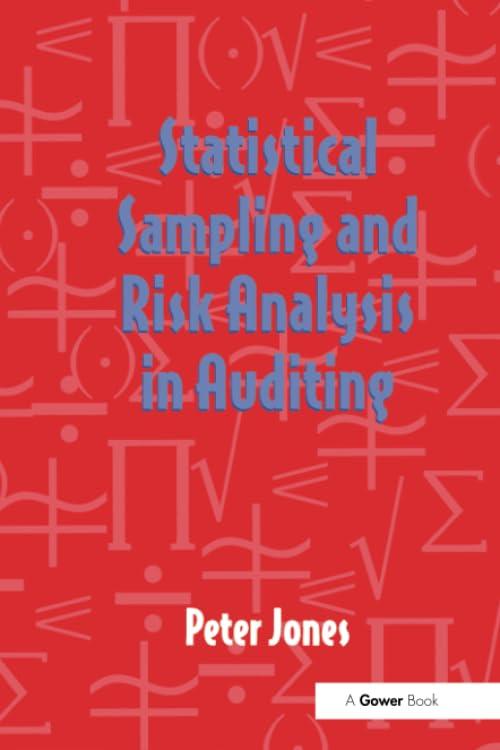Question
The following transactions were completed by Winklevoss Inc., whose fiscal year is the calendar year: Year 1 July 1 Issued $74,000,000 of 20-year, 11% callable
The following transactions were completed by Winklevoss Inc., whose fiscal year is the calendar year:
| Year 1 | ||
| July | 1 | Issued $74,000,000 of 20-year, 11% callable bonds dated July 1, Year 1, at a market (effective) rate of 13%, receiving cash of $63,532,267. Interest is payable semiannually on December 31 and June 30. |
| Oct. | 1 | Borrowed $200,000 by issuing a six-year, 6% installment note to Nicks Bank. The note requires annual payments of $40,673, with the first payment occurring on September 30, Year 2. |
| Dec. | 31 | Accrued $3,000 of interest on the installment note. The interest is payable on the date of the next installment note payment. |
| 31 | Paid the semiannual interest on the bonds. The bond discount amortization of $261,693 is combined with the semiannual interest payment. | |
| Year 2 | ||
| June | 30 | Paid the semiannual interest on the bonds. The bond discount amortization of $261,693 is combined with the semiannual interest payment. |
| Sept. | 30 | Paid the annual payment on the note, which consisted of interest of $12,000 and principal of $28,673. |
| Dec. | 31 | Accrued $2,570 of interest on the installment note. The interest is payable on the date of the next installment note payment. |
| 31 | Paid the semiannual interest on the bonds. The bond discount amortization of $261,693 is combined with the semiannual interest payment. | |
| Year 3 | ||
| June | 30 | Recorded the redemption of the bonds, which were called at 98. The balance in the bond discount account is $9,420,961 after payment of interest and amortization of discount have been recorded. Record the redemption only. |
| Sept. | 30 | Paid the second annual payment on the note, which consisted of interest of $10,280 and principal of $30,393. |
Required:
| 1. | Journalize the entries to record the foregoing transactions. Refer to the chart of accounts for the exact wording of the account titles. CNOW journals do not use lines for journal explanations. Every line on a journal page is used for debit or credit entries. CNOW journals will automatically indent a credit entry when a credit amount is entered. Round all amounts to the nearest dollar. |
| 2. | Indicate the amount of the interest expense in (a) Year 1 and (b) Year 2. |
| 3. | Determine the carrying amount of the bonds as of December 31, Year 2. |
Chart of Accounts
| CHART OF ACCOUNTS | |||||||||||||||||||||||||||||||||||||||||||||||||||||||||||||||||||||||||||||||||||||||||||||||||||||||||||||||||||||||
| Winklevoss Inc. | |||||||||||||||||||||||||||||||||||||||||||||||||||||||||||||||||||||||||||||||||||||||||||||||||||||||||||||||||||||||
| General Ledger | |||||||||||||||||||||||||||||||||||||||||||||||||||||||||||||||||||||||||||||||||||||||||||||||||||||||||||||||||||||||
|
| ||||||||||||||||||||||||||||||||||||||||||||||||||||||||||||||||||||||||||||||||||||||||||||||||||||||||||||||||||||||
Journal
1. Journalize the entries to record the foregoing transactions. Refer to the chart of accounts for the exact wording of the account titles. CNOW journals do not use lines for journal explanations. Every line on a journal page is used for debit or credit entries. CNOW journals will automatically indent a credit entry when a credit amount is entered. Round all amounts to the nearest dollar.
Year 1
PAGE 10
JOURNAL
ACCOUNTING EQUATION
| DATE | DESCRIPTION | POST. REF. | DEBIT | CREDIT | ASSETS | LIABILITIES | EQUITY | |
|---|---|---|---|---|---|---|---|---|
| 1 |
|
|
|
|
|
|
|
|
| 2 |
|
|
|
|
|
|
|
|
| 3 |
|
|
|
|
|
|
|
|
| 4 |
|
|
|
|
|
|
|
|
| 5 |
|
|
|
|
|
|
|
|
| 6 |
|
|
|
|
|
|
|
|
| 7 |
|
|
|
|
|
|
|
|
| 8 |
|
|
|
|
|
|
|
|
| 9 |
|
|
|
|
|
|
|
|
| 10 |
|
|
|
|
|
|
|
|
Step by Step Solution
There are 3 Steps involved in it
Step: 1

Get Instant Access to Expert-Tailored Solutions
See step-by-step solutions with expert insights and AI powered tools for academic success
Step: 2

Step: 3

Ace Your Homework with AI
Get the answers you need in no time with our AI-driven, step-by-step assistance
Get Started


